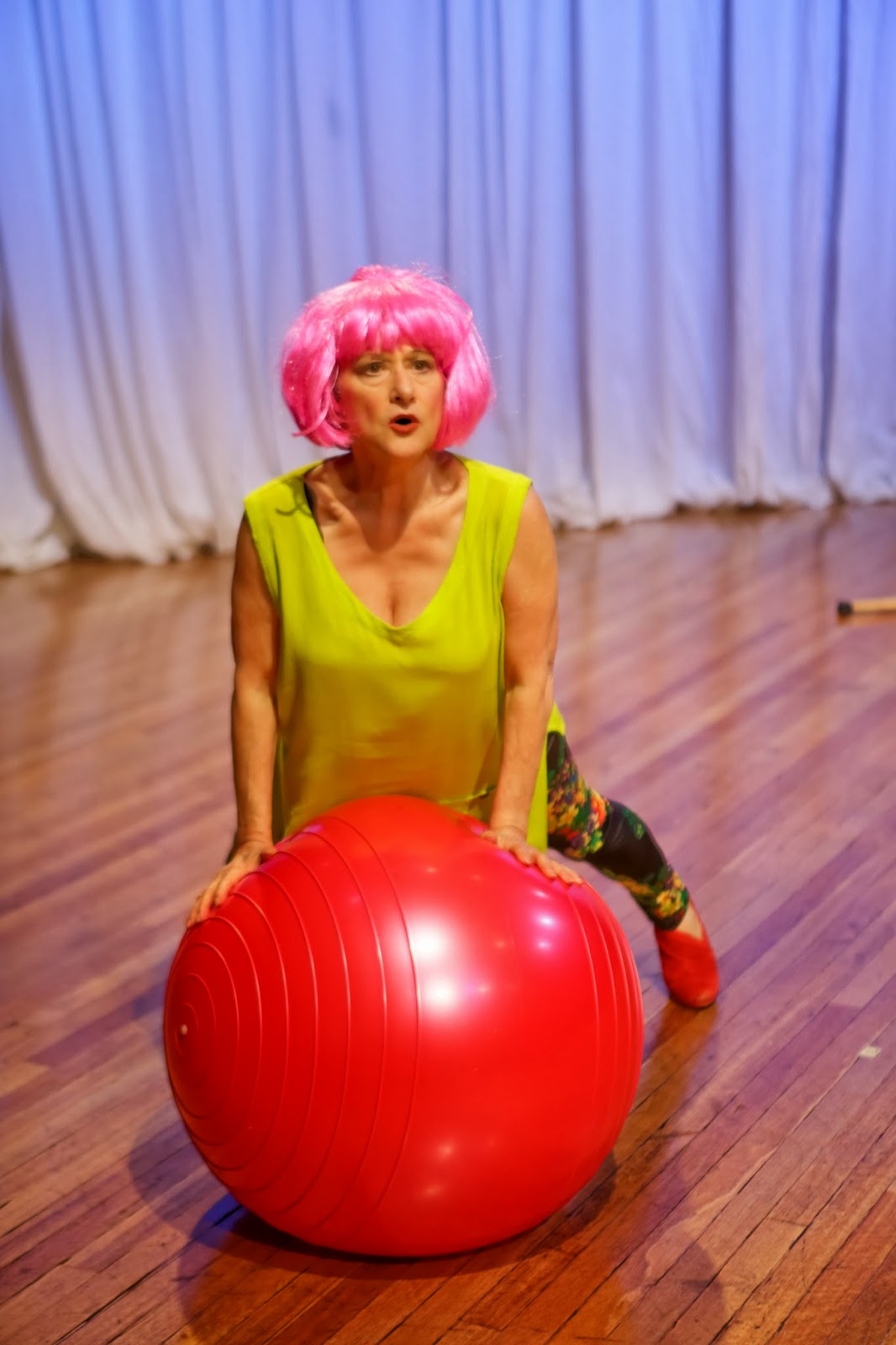What – MORE
FEMALE PARTS
Where and When – NORTHCOTE TOWN HALL – 08 FEBRUARY 2014 TO 23
FEBRUARY 2014
Reviewer - Joe Calleri.
Stars - 4 out of 5.
Stars - 4 out of 5.
 |
| Evelyn Krape works hard to keep mind and soul intact. Image Supplied. |
Disclosure - I attended the opening night of
this production on a complimentary ticket as the guest of a media invitee.
The program for More Female Parts states: “Sara Hardy wrote more
female parts specifically for Evelyn Krape to perform and Lois Ellis to direct.
It is a ‘thirty years on’ celebration of their original, phenomenally
successful production of Female Parts by Dario Fo and Franca Rame in 1982.”
It may be thirty years on, but diminutive performer, Krape is in fine
artistic and physical form - all sharp muscular angles, curly red hair, and often
chaotic, hyper-activity as she first portrays two oppressed women, and then the
narrator in an unusual adult parable / fairy tale, in this highly enjoyable, often thought-provoking,
three part performance.
Part 1, Can’t Sleep, Can’t Sleep, finds Krape portraying the hapless,
frenetic, chaotic, Julie Evans, a woman of a certain age whose cad of a husband
has run off and married a much younger woman who also happens to be a pole
dancer.
Such brutal spousal abandonment creates a new, harsh reality for
Julie that includes interviewing for mindless clerical jobs (including one as
an Arts Centre usher where for a team building exercise she and fellow
candidates must create a silver cube) in order to support herself, and dealing
with the mindless bureaucrats at Centrelink.
But, Evans also must deal with problems associated with her own failing
memory, and that of her ageing mother, a gay son who is about to be married in
London, and two precocious grandchildren, Frangipane and Kayell.
And, if you though life for women was difficult in 2013, just wait
until you visit the pink-wigged, floral leotarded, yellow fluoro t-shirted, Veronica
in Part 2 titled “Penthouse Woman 2044”. Veronica’s life seems enviable – she
lives on the 99th floor of an apartment building in Melbourne, where
she is surrounded by a variety of exercise equipment, is never alone with her
NewTube connections, the talking, ever-amenable computer, Pal (think HAL in
2001: A Space Odyssey), and possesses the magical Instashop delivery system,
where goods materialise within mere seconds of submitting an on-line order.
Wow!
But, these wiz-bang technological marvels designed to make one’s
life so easy, disguise a Dante’s Inferno-type of existence for Veronica.
We discover she must resort to a series of positive affirmations (“60 is the
new 30”) and gruelling physical exercise to keep mind and soul intact. Veronica,
you see, is a prisoner in her own apartment; where the windows cannot be
opened. While her businessman husband jets around the globe, Veronica has not
left her apartment in years.
And therein lays one of the beauties of Hardy’s writing and
Krape’s performance – the ability to quickly switch emotional gears, from laugh
out loud hilarity one second to though-provoking pathos and genuine concern the
next.
And, what of those wonderful on-line “contacts”? Well, her new
contact, Glenda, is also a prisoner, but suffers the indignity of wearing a
collar and long chain.
While Veronica can never be physically free of her surroundings,
at least she has freedom of thought.
While Part 3, Hip Op, lacks some of the emotional layering of the
first two parts, it allows Hardy an opportunity to show off some very clever
writing, and Krape yet another opportunity to display her wonderful, impish
physicality, this time as narrator of an unusual adult fairy-tale / parable regarding
the Ginger Family, and their three children, Angelica, Emily and Albrecht.
Youngest daughter, Emily, falls under the influence of wickedly
funny, foul-mouthed, Fluckety Dolly, and decides to become an economist.
This is where the fairy tale transforms into parable. Emily, you see, wears a
glass mortar-board which causes her to hit the ceiling (get it?) thereby preventing
her from climbing the corporate ladder.
Like all great fairy-tales, there is a conveniently happy ending
of sorts, but, by the end of the third part, we have well and truly gotten the
message.
Even if you are not a feminist, this rewarding, often laugh out
loud funny piece gently, and movingly highlights some recognisable, relatable,
very serious, and festering social issues that confront women on a daily basis,
while displaying the loveable Evelyn Krape’s highly skilled clown work.
- Ends -

No comments:
Post a Comment